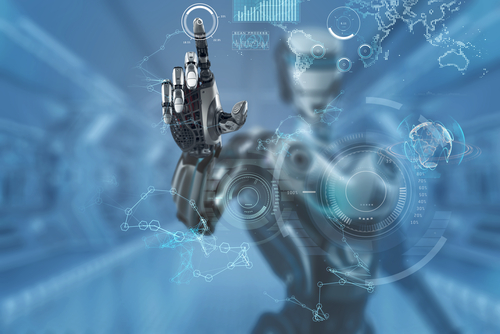Artificial intelligence (AI) is no longer just a sci-fi fantasy. It’s here and fits right into our data-driven world. Many people don’t realise they already use AI technology daily. Do you use voice recognition on your smartphone? Then you’re using AI technology.
copyright by www.cbronline.com
 Despite the impressive growth of AI over the last few decades, it’s still in its infancy. We’re only scratching the surface. This makes it a pivotal time to be part of this industry. Consumers are using more and more apps and smart technology. This is driving the global AI market. Couple that with the growing use of AI to improve customer services, and you see the depth of its potential. So how is AI evolving and, more importantly, how will it improve our lives? The answer is far from simple. AI will improve most, if not all, aspects of our everyday life.
Despite the impressive growth of AI over the last few decades, it’s still in its infancy. We’re only scratching the surface. This makes it a pivotal time to be part of this industry. Consumers are using more and more apps and smart technology. This is driving the global AI market. Couple that with the growing use of AI to improve customer services, and you see the depth of its potential. So how is AI evolving and, more importantly, how will it improve our lives? The answer is far from simple. AI will improve most, if not all, aspects of our everyday life.
AI to conquer the world
AI will help make drones, connected cars, connected appliances and robots an everyday reality. Imagine 3 years from now: The internet of things (IoT) and other new technologies will create an explosion of communication. We see a future where you’ll be able to communicate with your home appliances to make shopping requests to prepare a meal, your self-driving car will take itself for repairs and back home without you lifting a finger. The possibilities are endless. But it doesn’t stop there. AI goes beyond convenience and enters the world of saving lives. The first step toward advanced AI is smart automation and predictive analytics.
Wearables and e-doctors
Today, smart watches monitor your heart rate, blood pressure and the number of steps you’ve taken in a day. Soon, smart devices may collect advanced vital signs from blood tests, glucose measurements and more. And the technology would collect this routinely, just like visiting your doctor. AI is set to be able to change the medical industry. It could help identify abnormalities and early signs of illnesses and reduce hospital visits and wait times. And, perhaps most importantly, it might detect health concerns faster than routine check-ups. It could even suggest the best course of treatment based on billions of data points. […]
read more – copyright by www.cbronline.com


Artificial intelligence (AI) is no longer just a sci-fi fantasy. It’s here and fits right into our data-driven world. Many people don’t realise they already use AI technology daily. Do you use voice recognition on your smartphone? Then you’re using AI technology.
copyright by www.cbronline.com
AI to conquer the world
AI will help make drones, connected cars, connected appliances and robots an everyday reality. Imagine 3 years from now: The internet of things (IoT) and other new technologies will create an explosion of communication. We see a future where you’ll be able to communicate with your home appliances to make shopping requests to prepare a meal, your self-driving car will take itself for repairs and back home without you lifting a finger. The possibilities are endless. But it doesn’t stop there. AI goes beyond convenience and enters the world of saving lives. The first step toward advanced AI is smart automation and predictive analytics.
Wearables and e-doctors
Today, smart watches monitor your heart rate, blood pressure and the number of steps you’ve taken in a day. Soon, smart devices may collect advanced vital signs from blood tests, glucose measurements and more. And the technology would collect this routinely, just like visiting your doctor. AI is set to be able to change the medical industry. It could help identify abnormalities and early signs of illnesses and reduce hospital visits and wait times. And, perhaps most importantly, it might detect health concerns faster than routine check-ups. It could even suggest the best course of treatment based on billions of data points. […]
read more – copyright by www.cbronline.com
Share this: